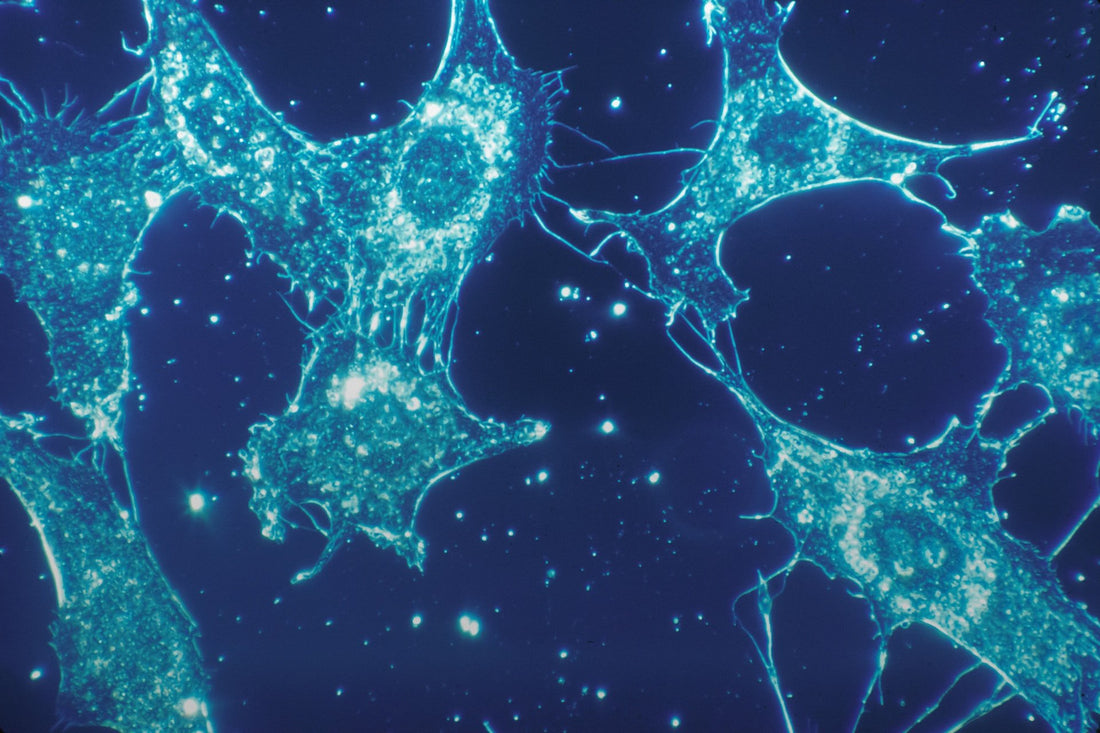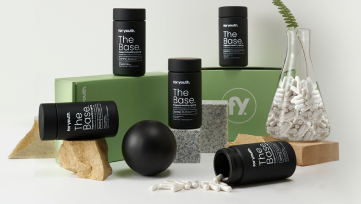The Role of NAD+ in Cellular Senescence


 Shop our NMN
Shop our NMN 
You’re on a journey to unlock the secrets of aging. Imagine cellular senescence as a ticking clock within every cell, and NAD+ as the key that might slow it down. You’ll delve into how NAD+ impacts this process, potentially offering new paths toward healthier aging.
It’s fascinating to explore the intricate mechanisms of our body’s aging process. Understand the role of NAD+ boosters like NMN and NR in decelerating cellular aging. Discover how natural sources and supplements can increase NAD+ levels in the body. Learn about the amazing potential of NMN in slowing the aging process by affecting NAD+ levels. Dive further into the relationship between NAD+ and cellular health, and how this association might pave the way toward anti-aging breakthroughs.
Read our blog:
–Boost Longevity And Delay Aging With NMN-C: The Ultimate Supplement
–FDA Rejects NMN Supplement, Amazon Pulls Products
–Unlocking The Secrets Of NR: The Anti-Aging Vitamin
-And more, visit our blog
By signing up, you consent to receive For Youth emails
Get The Latest On Longevity Delivered To Your Inbox.
Understanding the Basics of NAD
Before we dive into its role in cellular senescence, let’s first understand what NAD+ is and why it’s so important.
You see, NAD+, or Nicotinamide Adenine Dinucleotide, is a crucial coenzyme found in every cell of your body. It’s involved in hundreds of metabolic processes, but you should pay special attention to two: energy production and DNA repair.
NAD+ helps convert the food you eat into energy your cells can use. Without it, they’d be powerless – literally! Additionally, when DNA strands are damaged, NAD+ steps up to assist with their repair.
That’s why maintaining healthy levels of this coenzyme is critical – it keeps your cells energized and in top shape! So remember: no NAD+, no party for your cells!
How Cellular Senescence Occurs
You’re about to dive deeper into the fascinating world of cellular aging.
You’ll discover what triggers senescence, and how it’s not just about getting older – it’s a complex process that involves many factors at the molecular level.
It’s going to be an intriguing journey as you unravel the intricate details of this unavoidable biological phenomenon known as the cellular aging process.
Senescence Triggers
It’s important to understand that stressors such as DNA damage, oncogenic signals, and mitochondrial dysfunction can trigger cellular senescence. These triggers act as warning signs for your cells. When they detect these signals, they enter a state of permanent growth arrest – a process known as senescence.
In response to DNA damage or oncogenic signals, your cells activate pathways like the p53/p21 and p16INK4a/RB tumor suppressor pathways. They’re crucial in halting cell proliferation and preventing tumorigenesis.
Mitochondrial dysfunction is another red flag for your cells. It disrupts energy production, leading to oxidative stress and further DNA damage.
Understanding these triggers helps you grasp how factors like aging, lifestyle choices, or environment contribute to cellular senescence and overall health conditions associated with it.
Cellular Aging Process
Understanding the aging process at a cellular level can shed light on why you might feel older than your years. It’s all about NAD+, a crucial molecule in your cells that declines as you age. This little guy is vital for energy production, DNA repair, and cell health overall.
When NAD+ levels drop, cells start wearing out faster —that’s what we call ‘cellular senescence’.
But don’t despair! You’re not helpless against this process. Research suggests boosting your NAD+ levels can slow down cellular aging and even reverse some aspects of it.
The Connection Between Nad+ and Cellular Senescence

 Shop our NMN
Shop our NMN 
You’re about to delve into a fascinating discussion that explores the connection between NAD+ and cellular senescence.
You’ll explore the compelling impact of NAD+ on senescence and how it interplays with cellular aging.
Get ready to unpack the intricate role of this coenzyme in maintaining youthfulness at a cellular level, potentially revolutionizing our understanding of aging.
NAD+ Impact on Senescence
NAD+ plays a crucial role in slowing down the process of cellular senescence, doesn’t it? It’s like your body’s own fountain of youth.
When NAD+ levels are high, you’re less likely to experience the adverse effects of aging at a cellular level. This powerful molecule helps maintain DNA health and boosts your cells’ ability to repair themselves.
However, as you age, your body produces less NAD+. This decline can lead to increased cell damage and quicker cell senescence. But don’t fret!
Cellular Aging and NAD
It’s fascinating to delve into how the aging process at a microscopic level can be influenced by certain molecules in our bodies, isn’t it? The molecule NAD+ plays a significant role in cellular senescence and thus, affects your body’s aging process.
Here’s what you need to know:
- NAD+ is crucial for energy production in cells.
- As we age, our bodies’ NAD+ levels naturally decline.
- Low NAD+ levels lead to accelerated cell aging.
- Boosting NAD+ levels can reverse some signs of cellular senescence.
- Certain foods and supplements can help increase your body’s NAD+.
Nad+ and Its Impact on Aging Cells
There’s mounting evidence that NAD+ plays a significant role in the aging process of cells. This coenzyme aids in energy production and DNA repair, both critical for maintaining youthful cells. As you age, your body’s NAD+ levels naturally decrease, leading to increased cellular aging.
But don’t despair! Researchers are uncovering ways to boost NAD+ levels in our bodies. Some suggest regular exercise and a balanced diet can help. Others are exploring potential supplements that might restore these crucial levels.
In essence, understanding NAD+’s impact on cell aging could be key to unlocking new anti-aging strategies. So keep an eye out for more research on this front. It might just lead us toward the fountain of youth we’ve been searching for!
The Potential of NAD+ in Slowing Cellular Aging
After delving into how NAD+ impacts aging cells, let’s now explore its potential in slowing down cellular aging. Here’s some fascinating food for thought:
- Scientists believe that boosting NAD+ levels may rejuvenate cells.
- Some studies show a correlation between increased NAD+ and prolonged lifespan in yeast and mice.
- Research is underway to understand if the same applies to humans.
- Certain supplements are alleged to boost NAD+ levels, but their effectiveness is still being examined.
- While it’s not a magic bullet, NAD+ certainly holds promise in our fight against aging.
-Read the science behind NMN.
–Is NMN Safe?
–How much NMN should I take per day?
Current Research and Future Perspectives on NAD+ and Cellular Senescence
Currently, researchers are diligently working to unravel the mysteries surrounding this potent compound and its potential effects on aging cells. As you navigate through the complex world of cellular biology, it’s essential to keep up with these emerging discoveries.
Need More About For Youth
⇒ For Youth harnesses the science of longevity.
Researchers now view aging as a “disease” with the potential for treatment. While no miracle cure exists, numerous methods can slow down or even reverse aging at the cellular level. At For Youth, we make this scientific knowledge accessible to everyone.
Aging is the underlying cause of many ailments we face, ranging from minor concerns like wrinkles to more severe conditions such as Alzheimer’s or cancer. Therefore, delaying the aging process can lead to extended, healthier lives.
For Youth assists in monitoring and mitigating the effects of aging by providing a biological age test and scientifically proven, laboratory-tested, and meticulously sourced dietary supplements like NMN or resveratrol.
What does For Youth offer you?
→ The Base – NMN

Description (The Base – NMN) by For Youth:
NMN is a research-supported rejuvenating supplement that helps maintain youthful cells by increasing NAD+ levels, essential for cellular energy. Nicotinamide mononucleotide (NMN) is a naturally present compound in our bodies; however, increased amounts are required for enhanced longevity and overall well-being. Our NMN boasts an impressive 99% purity.
– Boosts energy levels
– Enhances cognitive clarity
– Promotes healthier skin
Conclusion
In conclusion, the fascinating exploration into the realm of NAD+ and cellular senescence provides insights into the significant influence it has on our body’s aging process at the cellular level. Utilizing this knowledge has tremendous potential in moderating aging rates, providing a radical new approach to healthy living. However, we’re just at the genesis stage of this intricate research, so there’s more to discover yet.
In the context of For Youth, this organization is at the forefront of translating this complex science of longevity into practical applications. It views aging as a treatable condition rather than an unavoidable outcome, offering innovative methods to decelerate or even reverse it on a cellular level. From minor age-related issues like skin aging to more critical diseases like Alzheimer’s or cancer, For Youth aids in offering comprehensive solutions. Whether it’s utilizing the latest biological age test or providing meticulously curated dietary supplements such as NMN or resveratrol, For Youth is leading the pack in promoting healthier, longer lives.
Specifically, their product, The Base – NMN, offers an evidence-backed revitalizing supplement that helps promote youthful cells by enhancing the levels of NAD+, vital for cellular energy. This unique offering stands as a testament to their commitment to promoting longevity and enhancing overall well-being. Their pursuit of pushing the boundaries of scientific research is an intriguing journey to follow, and we can all look forward to more pioneering anti-aging breakthroughs.
→ Foryouth








